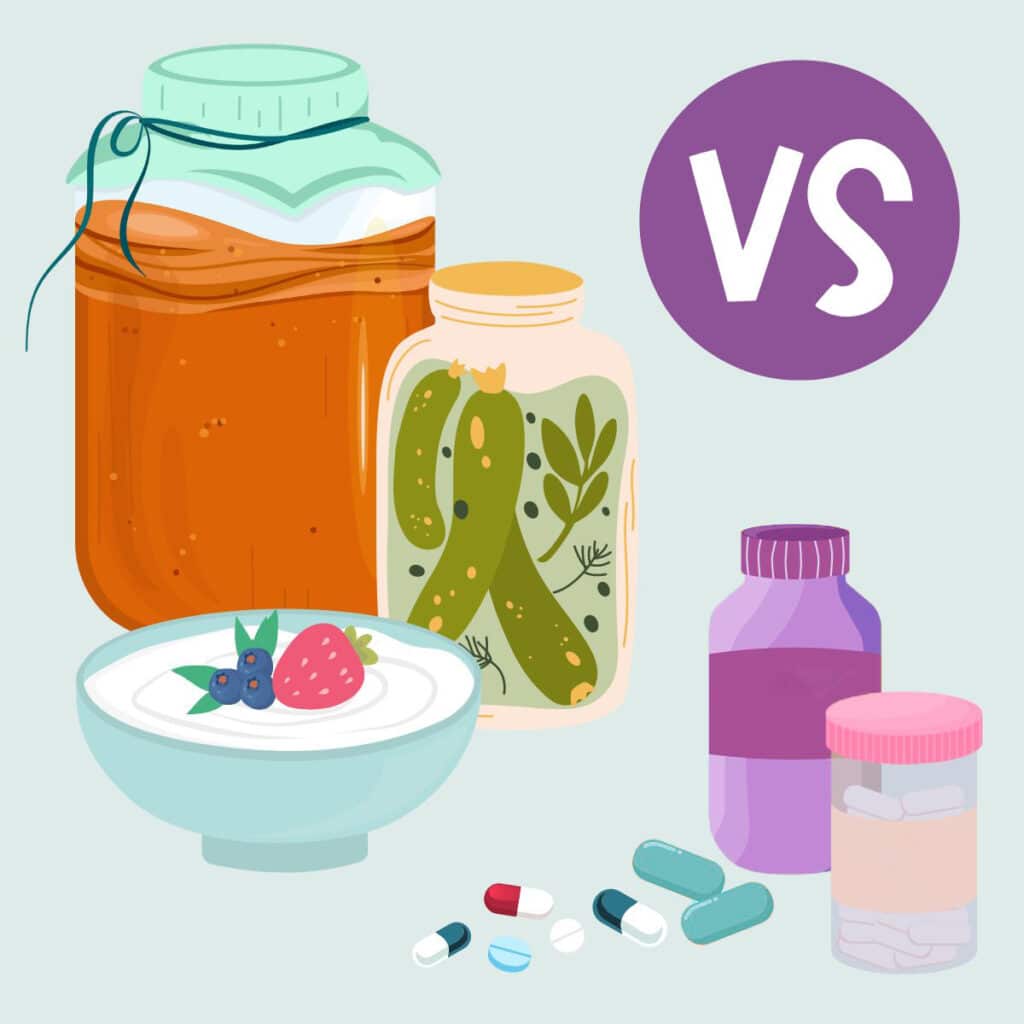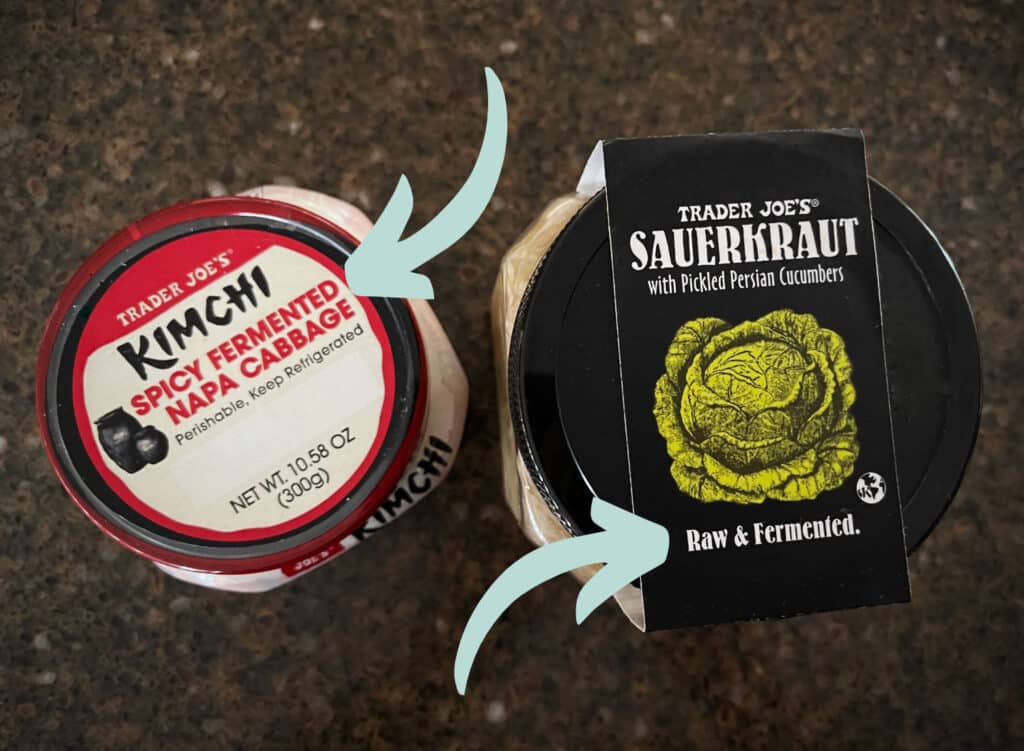By now, most of us have at least a general understanding that maintaining healthy gut bacteria is pretty darn important to our overall health.
But what exactly does that mean?
A healthy microbiome refers to having a well-balanced and diverse community of microorganisms living in and on your body — particularly in the gut. The microbiome is a complex ecosystem of bacteria, fungi, viruses and other microbes that play a crucial role in supporting, well, pretty much every aspect of your health —
from digestion
to metabolism
to healthy skin, nails and hair
to mental health
to a robust immune system
(and everything in between).
Simply put, if your microbiome is out of whack, you will be out of whack.
The gut’s microbiome is a pretty competitive place. Healthy microbiota are constantly in competition with harmful pathogens for nutrients and real estate in our gut. The name of the game is helping the “good guys” to outcompete the competition!
A great place to start is a whole-food based diet rich in soluble fibers (prebiotics) and fermented foods (probiotics) to provide and ongoing supply of reinforcements and nourishment for good guys. Avoiding unnecessary use of antibiotics (which indiscriminately kill off the good with the bad) and managing stress are also essential for maintaining a heathy microbiome.
Stress…? How can stress affect the microbiome?
The gut and the brain are closely interconnected. The gut-brain axis is a bidirectional communication pathway that connects the central nervous system (the brain and spinal cord) with the enteric nervous system (ENS) in the gastrointestinal tract. The ENS, often referred to as the “second brain,” is a complex network of neurons and neurotransmitters that governs the functioning of the gut independently of the central nervous system.
Emotions, thoughts, stress and other mental states can, quite literally, impact gut function. By the same token, the gut can also send signals to the brain, affecting cognitive functions such as mood and emotions.
This bidirectional communication between the gut and the brain can create a feedback loop. For instance, stress and negative emotions can lead to changes in gut function, which in turn can send signals back to the brain, potentially exacerbating the stress response or impacting mood further. This cycle leads to a vicious cycle of negative feedback loops that can be tough to break.

The microbiome & your immune system
A healthy and diverse gut microbiome is crucial for the proper functioning of the immune system. In fact, the gut-immune connection is SO significant that imbalances in the gut microbiota (aka dysbiosis) can lead to an increased risk of infections, autoimmune diseases, allergies and all kinds of inflammatory disorders.
The gut microbiome interacts with various immune cells located in the gut-associated lymphoid tissue (“GALT”) — a network of immune tissues in the intestinal walls. These immune cells recognize the presence of beneficial and potentially harmful bacteria in the gut.
Ongoing exposure to a diverse range of microbes helps to “train” our immune system, educating immune cells to differentiate benign substances from harmful pathogens. A well-trained immune system is able to respond appropriately to harmless substances like food particles and commensal (“good”) bacteria and prevent unnecessary immune responses, which can lead to chronic inflammation and autoimmune disease.
Fermented foods & digestion
Taken alongside a meal, fermented foods also support the mechanics of healthy digestion. Probiotics, enzymes and organic acids in fermented foods can assist in breaking down your meal, aiding the digestive process and ensuring that your body can efficiently break down and absorb nutrients.
This is particularly important because incomplete digestion of food particles can lead to gases and fermentation byproducts that disrupt the gut environment and affect the integrity of the intestinal lining. When proteins from food are not fully broken down into their individual amino acids during digestion, larger protein molecules can pass through the compromised intestinal lining, triggering an immune response and increasing inflammation in the gut and leading to intestinal permeability, aka leaky gut.
A healthy gut lining acts as a physical barrier, preventing harmful substances, toxins and pathogens from entering the bloodstream and the rest of the body. A compromised intestinal wall is a surefire way to end up with chronic systemic inflammation, food allergies and autoimmune disease. Your gut lining is the first line of defense between the internal environment of the gut and the rest of the body, and when that barrier deteriorates and things that don’t belong in the bloodstream get into the bloodstream, your body will react — for better or for worse.
Whole foods vs pills
Okay okay — so we get that probiotics are good thing, but why go to the trouble of eating fermented foods instead of just taking a convenient probiotic pill?
Probiotic supplements offer the advantage of delivering specific strains of probiotics in controlled amounts, which may be beneficial for addressing specific health concerns, but relying solely on isolated strains of probiotics may have limitations and potential drawbacks in the long run.

It may not seem like it, but the science of probiotics is relatively young. What if taking specific strains in isolation is actually not a good thing? * Consider that most things in nature are synergistic. The gut microbiome is incredibly complex, and the interactions between different microbes are intricate and multifaceted. Taking specific strains in isolation may not capture the full complexity and synergy that naturally occurs within the gut microbiome.
* For the record, I’m not saying they are definitely bad in all situations, I’m just asking “What if?” As with vitamin supplements (zinc/copper, vitamin E/selenium and vitamins A/D/K are good examples) it seems like the more we learn, the more this is shown to be true.
Fermented foods offer a more holistic and synergistic approach to supporting gut health over the longterm. They naturally contain a wide variety of probiotic strains, enzymes and organic acids, as well as their own compliment of nutrients, vitamins and minerals. Many fermented foods also contain their own prebiotics, which serve as built-in food for the probiotics and help them thrive in the gut.
Fermented food ensures you’re getting the whole enchilada and not just a small portion of it.
Is homemade really that much better?
TLDR: yes!
While objectively better than the non-fermented, vinegar-pickled products out there, many commercially produced fermented foods you’ll find at the health food store are fermented only briefly and at higher temperatures. This allows manufacturers to produce larger quantities in a shorter amount of time; however, this rapid fermentation process may not provide the same quality and quantity of probiotics as traditional, slower fermentation methods.
Additionally, to extend the shelf life and ensure product stability during transportation and storage, some commercially available fermented foods actually undergo heat treatment.
No kidding. 🤦♀️
Flash-pasteurization is a form of pasteurization where the food is exposed to high heat for a very brief period. This process aims to minimize the impact on flavor and nutritional content compared to traditional pasteurization, but as you might imagine, it still compromises the number of live probiotics present in the final product.
Homemade fermented foods avoid the pitfalls found with many commercially made products and also tend to be far more cost-effective — particularly when using surplus or in-season produce. For the full benefits of live probiotics, making fermented foods at home is the way to go.
All that said, don’t let perfect be the enemy of good.
Everyone’s situation is different.
If you honestly can’t find the time or bandwidth to make homemade ferments consistently, look for the highest quality products you can afford. Look for small-batch fermented products in the refrigerated section that mention “live” and “active cultures” to increase your likelihood of getting a product with a higher probiotic content, made using a more authentic fermentation process.

Consistency is king
Many health benefits associated with fermented foods — such as improved digestion, enhanced immune function and reduced inflammation — are observed over time.
Consistency trumps quantity when it comes to reaping the benefits.
Probiotics tend to be transient microorganisms in the gut, meaning that they do not permanently colonize and establish themselves in the gut like the resident gut microbiota. Think of probiotics more like guests who provide beneficial effects during their visit, but they need to be continuously introduced to the gut to have a meaningful and lasting impact on the gut microbiome.
The easiest way to do this is the same way our ancestors did: Commit to making fermented foods a (small) part of every meal!
You don’t need a ton of fermented food to make a huge impact on your health either. In fact, consuming excessive amounts of fermented foods can cause a histamine reaction in some sensitive individuals.
The fermentation process can increase histamine levels in fermented foods like aged cheeses, sauerkraut, kimchi, yogurt and kefir. While this isn’t going to be a problem for most people, those with histamine intolerance may experience adverse reactions.*
(BTW, if you suspect a histamine intolerance, you might be lacking a digestive enzyme called Diamine oxidase (DAO) that helps break down excess histamine in the body. There are a number of over the counter supplements out there that contain DAO. It might be worth trying it out to see if your symptoms improve!)
So especially if you’re just starting out, aim for a few spoonfuls of yogurt, a small glass of kombucha or water kefir or a condiment-sized serving of *real* sauerkraut, fermented vegetables or a cube of raw, unpasteurized cheese with every meal…
As you get more comfortable with using fermented foods, you’ll find a groove that works for your family and suits your schedule.
A variety of fermented foods eaten regularly, even in modest amounts, deliver a steady and diverse supply of beneficial microorganisms to the gut, providing ongoing digestive support, improved breakdown and absorption of nutrients while supporting a robust immune system.
Start small and pay attention to how you feel.
Adjust, rinse and repeat.
This is the way.
More on fermented foods and easy home fermenting:
Wise Traditions & Homemade Sauerkraut
Quick Fermented Garlicky Beets
* Histamine intolerance is individualized. Not everyone will have a reaction to fermented foods. Symptoms of a histamine reaction can include things like headaches, skin rashes and digestive issues. If you suspect you have histamine intolerance, consult with a healthcare professional who can help you identify trigger foods and develop a dietary plan that works for you.


